Home / Dental Treatments / Dental Implants
Dental Implants
Are you feeling ashamed of your smile because you are missing one or more teeth? Has tooth loss severely affected your social life?
Dental implants are an ideal, advanced, safe, and popular solution to missing teeth. They look and function like natural teeth, enabling patients to speak, chew and smile with confidence!
They are suitable for patients of any age, as long as their oral health is satisfactory. The implant placement procedure is painless as the oral surgeon uses local anesthesia that does not affect the surrounding teeth. You can have your implants placed in the upper or lower jaw, providing a permanent, stable and durable foundation for a replacement tooth, such as a crown or a bridge.
Restore your smile, confidence, and oral health by reaching out to Smalto Dental Clinic for top-quality dental implant placement in Cyprus!
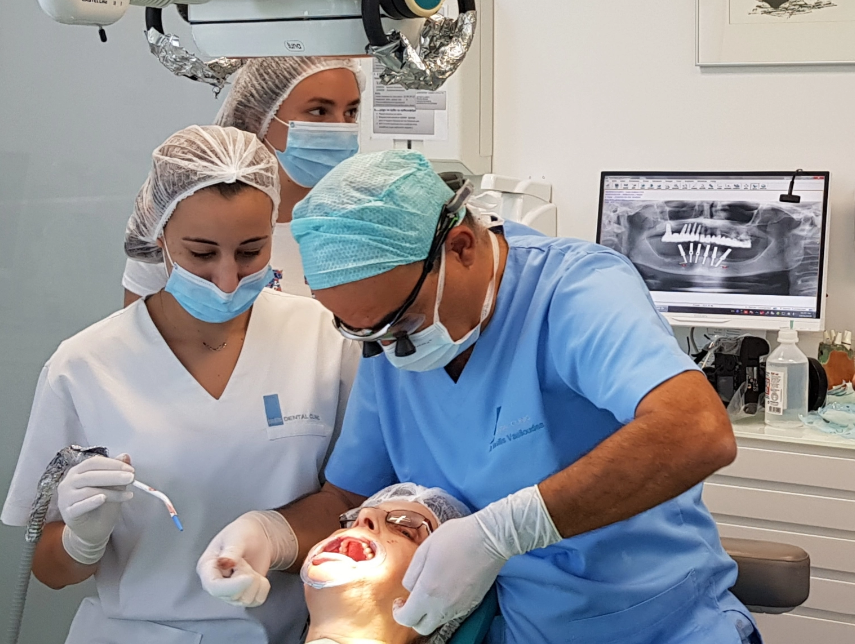
Call us today and take the first step to a
healthier, more beautiful smile!
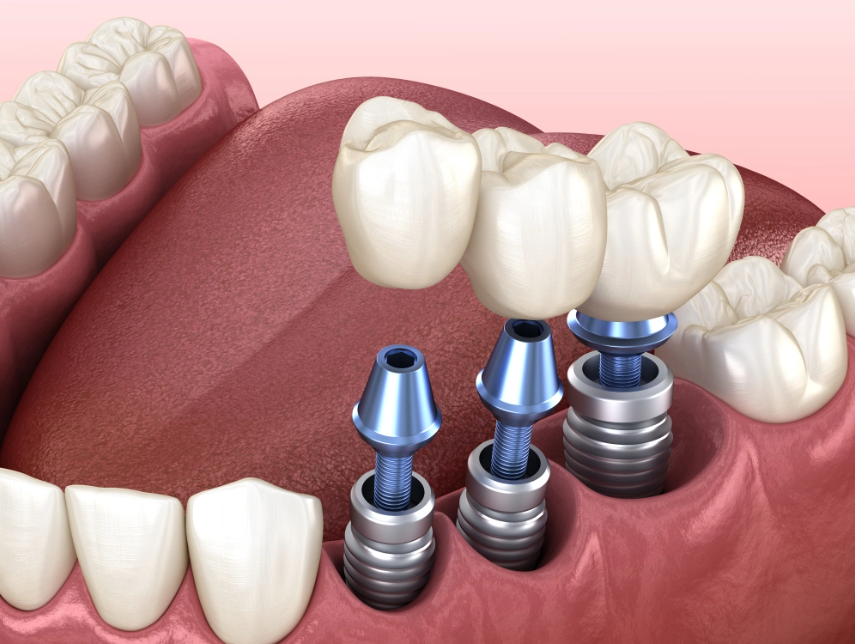
Dental implants are the best, most advanced option in modern dentistry for dental rehabilitation. In other words, you can replace missing teeth with dental implants that look and feel like your natural teeth.
A dental implant is a small, titanium post that is surgically placed into the jawbone to replace the root of a missing tooth. They have been around since 1980, yet modern dentistry has made them available for people of all ages and backgrounds.
Dental implants come in two parts: the first part replaces the tooth’s root through a small operation underneath the gums in the bone of the jaw. The second part involves the visible part in the mouth on which the tooth is placed.
Dental implants are a permanent and reliable solution for missing teeth, unlike dentures, which can slip or move around in the mouth.
Benefits of Dental Implants
Dental implants:

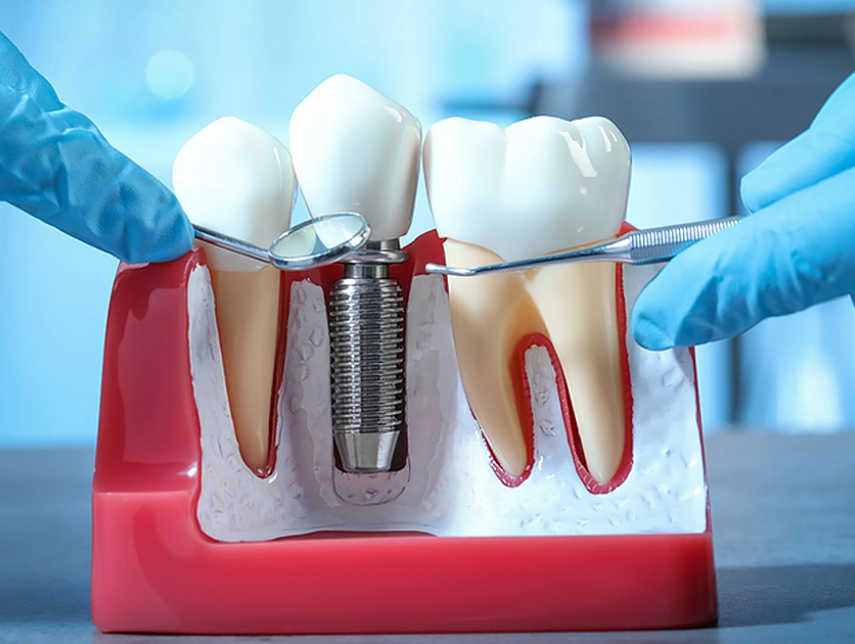
Dental implants are placed using minor surgery under local anesthesia in a dental setting. The oral surgeon uses a titanium screw through a technique that guarantees their right and accurate positioning. This way, the doctor ensures the dental implant’s longevity and the best aesthetic results.
The implants are covered with the gums and remain in the jawbone for 2-3 months, to allow for the necessary bonding with the surrounding bone (osseointegration).
After the necessary waiting period, the implants are uncovered, and the next step of preparation for the prosthetic work begins. Meanwhile, the patient can use temporary bridges or dentures.
The absence of sensory nerves in the jawbone means people usually do not experience pain. Moreover, the oral surgeon usually performs local anesthesia to numb the area being worked on. During the procedure, the patient may feel some pressure or vibrations, but should not experience any significant discomfort.
The majority of patients who undergo dental implant placement state that the discomfort is much less than expected, while in the few cases where minor pain is observed, a simple painkiller is enough.
Note that every patient’s experience may vary as some may have a higher pain tolerance than others. Smalto’s dentists and oral surgeons can discuss any concerns you may have about dental implant placement and provide detailed information about what to expect.
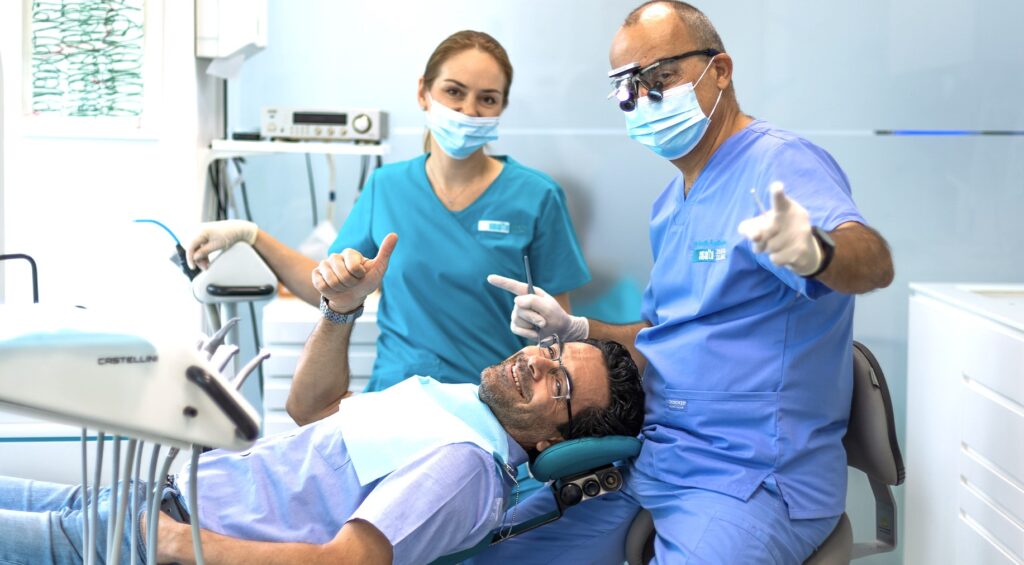

Modern dentistry technology allows, in many cases, the placement of dental implants right after the extraction of natural teeth and the loading of teeth within 48 hours. This way, we eliminate the waiting period and make the whole procedure simpler and easier to handle for both the patient and the dentist.
Clinical practice and related research have shown that this method has excellent results in terms of stability and aesthetics.
Our oral surgeons at Smalto Dental Clinic in Nicosia are experts in advanced implant placement techniques, including All–On-4 Prosthetic Rehabilitation in the lower jaw, where all teeth can be supported by 4-5 dental implants.
Successful dental implant placement requires an adequate amount of good-quality bone. In cases where the bone is not enough or is of poor quality, various bone grafting techniques can be used. For example, if there is not enough bone in the upper jaw area (sinus), bone grafting can allow for the successful placement of dental implants.
Bone grafting involves adding bone material to the area where the implant will be placed in order to provide additional support for the implant and improve the overall success of the procedure. This material can be obtained from the patient’s own body, a donor source, or a laboratory-created substance.
After the bone grafting procedure, the patient will need to allow time for the grafted bone material to fuse with the existing bone tissue. This typically takes several months before the implant can be placed.
While the additional step of bone grafting may prolong the overall treatment time for dental implant placement, it can significantly increase the chances of success for the implant and provide a long-lasting solution for tooth replacement.


At Smalto Dental Clinic, we carry out a detailed examination, including a panoramic X-Ray, to develop a personalized treatment plan covering your needs and the number of implants required. Sometimes, the initial assessment may even involve computer 3D tomography.
In cases where extensive prosthetic work is required, there is no need to replace each lost tooth with an implant. Here are the most common prosthetic work options using dental implants:
Age is not necessarily a barrier to getting dental implants. Dental Implants are the ideal solution for ALL ages!
What is important is the general health and oral hygiene of the patient. As long as one’s overall health is good and the jawbone has sufficient density and volume to support the implant, h/she a good candidate for the procedure, regardless of age. In cases of patients who suffer from other health problems, dental implants can be placed following consultation with their doctor.
In those rare cases where no bonding is achieved between the bone and the implant, the implant is removed, the area is cleaned and, after a few weeks, a new implant is placed.
Many older adults have successfully undergone dental implant treatment at Smalto Dental Clinic with great results. Call our clinic in Nicosia today to learn more about dental implants!
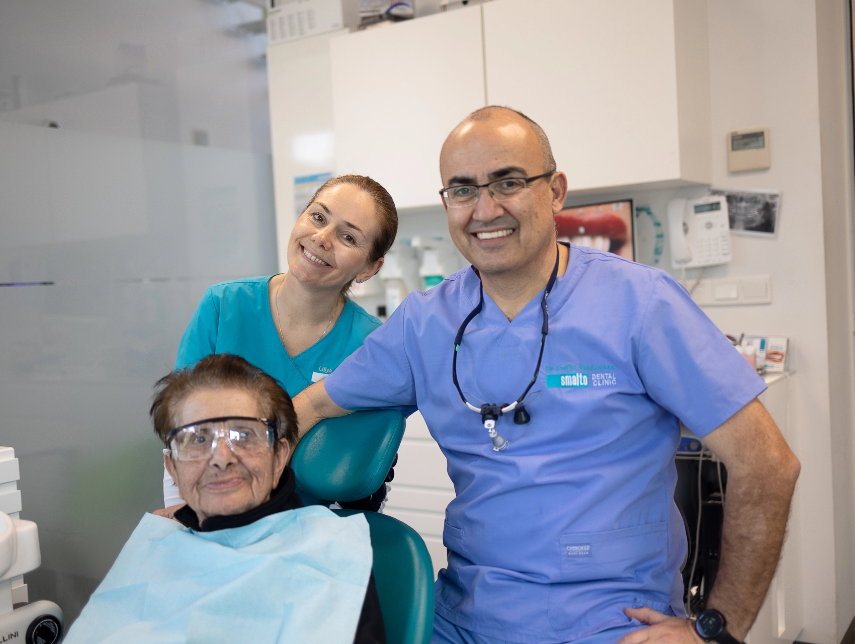

Many factors can come into play in regards to the success of dental implants. However, most important are their right positioning and maintaining good oral hygiene.
Dental implants may not run the risk of tooth decay. However, they may be affected by peri-implantitis, which is the inflammation of the gums and the bone around the implant. Consequently, oral hygiene is of the utmost importance.
Daily brushing and flossing combined with regular dental checkups are vital, exactly as we do with natural teeth. Smoking, as well as too much pressure on implants as a result of bruxism (teeth grinding), can also reduce implant success.
However, research has shown that in the 30 years of using dental implants, the success rate of related prosthetic work is more than 90%, which makes them the most reliable choice of modern dentistry.
Yes, both smoking and periodontitis can significantly affect the success of dental implants.
Smoking can have a negative impact on the healing process and increase the risk of implant failure. Tobacco use can reduce blood flow to the gums, slow down the healing process, and decrease the effectiveness of the body’s immune response. Therefore, it is recommended to refrain from smoking some days before the procedure, as well as some days after.
Implants can be used on patients suffering from periodontitis, following proper periodontal treatment and control of gum disease inflammation. As always, daily oral hygiene and dental care are of paramount importance.
If you are a smoker or have a history of periodontitis, it is essential to discuss these factors with your dentist or oral surgeon before undergoing dental implant treatment.
Dental implants can be a significant investment yet the benefits they offer are truly life-changing. The cost of dental implants in Cyprus can vary depending on several factors, including the number of implants needed, the type of implant used, and the complexity of the procedure. Generally, the cost of a single dental implant can range from 1400€ to 1800€, which may include the cost of the implant fixture, abutment, and crown.
While dental implants may seem expensive, they are a long-lasting and effective solution for missing teeth that can significantly improve your oral health, speech, and self-confidence. By talking to our experienced implant dentists and oral surgeons at Smalto Dental Clinic Nicosia, you can receive a personalized treatment plan that fits your needs and budget while achieving the best possible outcome.
Getting a dental implant may take several months to complete. Here are the general steps involved:
Your dentist will monitor your progress and ensure the implant is healing properly. Dental implants can last many years with proper care and provide a natural-looking, long-lasting solution for missing teeth.
When you have dental implants, it’s important to take proper care of them to ensure their longevity and success. Here are some things to avoid:
After dental implant surgery, you should allow enough time for the implant to properly fuse with the jawbone. This process is called osseointegration and typically takes 3 to 6 months. During this time, it’s recommended to follow a soft food diet and avoid chewing on the implant site to allow for proper healing.
Once the osseointegration process is complete, you can gradually reintroduce solid foods to your diet. However, it’s important to continue to be mindful of the implant site and avoid overly hard, sticky, or crunchy foods that could damage the implant or surrounding tissues.
Your dentist or oral surgeon will provide specific instructions on post-operative care and when you can resume normal eating habits.
Eating with dental implants should not be hard. It should feel quite natural once the healing process is complete.
After dental implant surgery, it’s recommended to follow a soft food diet for a few days to allow for proper healing. Once the implants have fully integrated with the jawbone, you should be able to eat a wide variety of foods with no problem.
Dental implants are designed to function and feel like natural teeth, so you should be able to bite and chew normally without any discomfort.
Yes, you can drink coffee with a tooth implant. Once the implant has fully healed and integrated with the jawbone, it should be just as strong and stable as a natural tooth. However, it’s important to maintain good oral hygiene and limit your consumption of foods and beverages that can stain teeth, such as coffee and tea.
It’s also important to wait until after the implant has fully healed before consuming hot beverages like coffee. Drinking hot liquids too soon after the procedure could irritate the surgical site and slow down the healing process. Your dentist or oral surgeon can provide specific guidelines on when it’s safe to resume your normal diet and habits after implant surgery.
After dental implant surgery, avoid consuming hot drinks for the first 24-48 hours as they can irritate the surgical site and prolong the healing process. It’s also recommended to avoid drinking through a straw or any other sucking motion that can dislodge the blood clot and cause a dry socket.
Your oral surgeon might also suggest you avoid alcoholic and carbonated beverages for the first few days, as they can also delay healing and cause irritation.